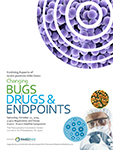
Thank you for your interest in this on demand activity. Please take a moment to review the program description, learning objectives, accreditation information, and faculty disclosures and biographies prior to viewing this activity. You will find the presentation at the bottom of this page.
*To claim credit for participation with this activity, please follow the directions beneath the presentation window.
Program Description
For the past 75 years, successive waves of antibiotic-resistant S. aureus (SA) strains have posed significant challenges to clinicians.1 And while the number of severe MRSA infections has trended lower in recent years, the number of deaths per year due to MRSA in the US has continued to outpace all other infections but those due to C. difficile that have been categorized as an Urgent or Serious threat by the CDC.2
This activity will explore the available agents for the treatment of patients at risk for MRSA infections and the ways in which providers can use an understanding of the corresponding drivers of efficacy and safety in order to implement evidence-based treatment approaches for individual patients and infection types.
- Scott II, RD. The Direct Medical Costs of Healthcare-Associated Infection in U.S. Hospitals and the Benefits of Prevention. Division of Healthcare Quality Promotion. National Center for Preparedness, Detection, and Control of Infectious Diseases. Publication CS200891. March 2009.
- Antibiotic Resistance Threats in the United States, 2013. Centers for Disease Control and Prevention.
Target Audience
The intended target audience for this activity is physicians and pharmacists who treat serious infections.
Learning Objectives
Upon completion of this knowledge and comprehension activity, participants should be able to
- Describe the clinical implication of recent changes in methicillin-resistant Staphylococcus aureus (MRSA) as a pathogenic organism, potential diagnostic and preventative measures, and their potential impact on patient outcomes.
- Discuss the nuances associated with interpretation of antimicrobial susceptibility testing methods in order to be able to translate the results into positive clinical outcomes.
- Compare and contrast the newer anti-MRSA agents based upon efficacy, PK/PD, and safety profiles across infection and patient types.
- Apply understanding of the pathogen, antibiotics, and patient factors in the treatment of Gram-positive infections including HAP/VAP, bacteremia, and ABSSSI.
Fee Information
There are no fees for participating in and receiving credit for this activity.
Computer Requirements:
Required Computer Hardware/Software:
Please ensure the computer you plan to use meets the following requirements:
- Peripherals: Computer speakers or headphones
- Monitor Screen Resolution: 320 x 480 or higher
- Media Viewing Requirements: Adobe Reader, Microsoft PowerPoint, Flash Player & HTML5
Accreditation Statement
 |
MedEDirect is accredited by the Accreditation Council for Continuing Medical Education to provide continuing medical education for physicians. Credit Designation: MedEDirect designates this educational activity for a maximum of 2.0 AMA PRA Category 1 Credits™. Physicians should claim only the credit commensurate with the extent of their participation in the activity. Participants must participate in the session and complete an activity evaluation before November 24, 2015. |
 |
MedEDirect is accredited by the Accreditation Council for Pharmacy Education as a provider of continuing pharmacy education. This activity has been assigned ACPE Universal Activity Number 0498-0000-14-009-H01-P and will award 2.0 contact hours (0.2 CEUs). Successful completion of the activity includes participating in the session, completing an activity evaluation before November 24, 2015, and passing a post-test with a minimum score of 70%. |
Scientific Integrity and Disclosure of Financial Interests
Support Statement
This activity is supported by an unrestricted educational grant from Theravance Biopharma Antibiotics, Inc.
Disclosures:
Andrew F. Shorr, MD, MPH receives lecture fees and grant support from and serves as a consultant/advisor to Astellas Pharma, AstraZeneca, Bayer, Cubist Pharmaceuticals, Endoclear, Forest Laboratories, Nabriva Therapeutics, Roche, Tetraphase Pharmaceuticals, and Pfizer.
Keith A. Rodvold, PharmD receives lecture fees from Cubist Pharmaceuticals and Forest Laboratories, and grant support from Forest and Theravance Biopharma. He serves as a consultant/advisor to Cempra Pharmaceuticals, Cubist, Durata Therapeutics, Forest, The Medicines Company, Roche–Genentech, Sanofi, Shionogi, Tetraphase Pharmaceuticals, and Theravance.
G. Ralph Corey, MD serves as a consultant/advisor to Achaogen, Cempra Pharmaceuticals, Cubist Pharmaceuticals, Forest/Cerexa, GlaxoSmithKline, The Medicines Company, Merck, Rib-X Pharmaceuticals, Theravance Biopharma, and Trius Therapeutics. He has served as a primary investigator or otherwise participated in clinical trials for Dr. Reddy’s Laboratories, Forest/Cerexa, GlaxoSmithKline, The Medicines Company, Merck, Pfizer, and Theravance.
Thomas Zimmerman, PhD (Reviewer, MedEDirect) has nothing to disclose.
Danielle Amodio (MedEDirect) has nothing to disclose.
Faculty Biographies

Andrew F. Shorr, MD, MPH
Associate Chief, Pulmonary and Critical Care
Washington Hospital Center
Associate Professor of Medicine
Georgetown University Hospital
Washington, DC
Click here to view Andrew F. Shorr, MD’s Bio

Keith A. Rodvold, PharmD, FCCP, FIDSA
Professor of Pharmacy Practice and Pharmacy in Medicine
Colleges of Pharmacy and Medicine
Co-Director, Section of Infectious Diseases Pharmacotherapy
Department of Pharmacy Practice
University of Illinois at Chicago
Chicago, IL
Click here to view Keith A. Rodvold, PharmD’s Bio

G. Ralph Corey, MD Infectious Diseases
Professor of Medicine
Duke University Medical Center
Durham, NC
Click here to view G. Ralph Corey, MD’s Bio
Credit Instructions
To claim credit for participation in this activity, please click the "Proceed to Test" button below.
Physicians: Complete the post test and program evaluation. Once submitted, you will be able to download your certificate.
Pharmacists: You must pass the test with a score of 70% or higher. Upon passing the post-test you will be led to the program evaluation. Once you have completed the program evaluation, proof of participation will be forwarded to ACPE/NABP and you will be able to download a copy of your certificate for your records.
ON DEMAND: Evolving Aspects of Gram-positive Infections: Changing Bugs, Drugs, & Endpoints
|
References and Resources
|
|


Not a member? Register here!